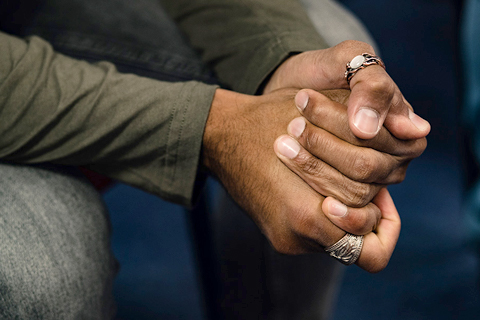A visceral reaction
Renée van der Vloodt describes how a dramatic event during rewind helped a client resolve a whole host of difficulties in her life.
AFTER 10 years as a human givens therapist I am still regularly delighted by the elegance and efficiency of this integrative way of working. By looking for patterns of behaviour, thoughts or feelings, one avoids getting subsumed by the content of a person’s story and can proceed with a light touch, weaving together the threads that are offered by the client. Lucy’s case beautifully illustrates my point, as the resolution of her seemingly disparate problems came from information she offered me as an aside, a sort of throw-away remark.
This is her story as she tells it, focusing on the elements that were most remarkable for her. Afterwards, I offer my own comments.
“My childhood was a happy one, although I did have a period of difficulty with my sleep when I was six or seven and I would lie awake crying for what seemed like hours, because everyone in the house had fallen asleep. My mother wasn’t very patient, so I ended up sobbing as quietly as possible into my pillow. Sometimes I’d wake up my little sister, just so that I wasn’t the only person awake in the house. I had a lot of little rituals to make me feel better – a certain number of steps to take to get to my bed and the checking and rechecking of light switches, doors and bathroom taps.
“In my early 40s I was catapulted very suddenly and unexpectedly into a period of turmoil, due to problems in my marriage. It was as if I’d been woken from a sleep very suddenly and the life I thought I was in wasn’t quite real, almost as if I had been experiencing it through cotton wool all this time.
“About a year prior to this, I had begun to experience an unexplained numbness in my fingers and between my shoulder blades. It was a real life-changing time that forced me to take stock of my career, my marriage, my beliefs and myself. I was also experiencing repeated episodes of anxiety, most particularly when I heard or read anything about sexual abuse. The palpitations I felt in my chest would be very strong and I could feel my heart thumping in my ears. I never mentioned this, just presuming it was a normal reaction to something so awful.
“As part of my self-discovery, I was taking a course in personal development and it was during this that what appeared to be a childhood memory resurfaced. In it, I woke up very suddenly from a deep sleep and, as my eyes adjusted to the darkness, I saw the shape of a figure approaching my bed. In the confusing and dreamlike state between sleep and wakefulness, I felt an icy ‘burning-like’ sensation of tingling in my hands and around my lips, the sort of feeling I’ve had when I’ve experienced a sudden, extreme fright and the adrenalin shoots through me. Then I had the sensation of drifting out of my body. I was about six years old at the time. The figure was my maternal grandfather.
“I had had no prior memory of the sensations or the event. Was the memory real? Certainly the sensations were. And it made some sense of the fact that I had always had a nagging feeling that something had happened that wasn’t quite right, and could have been an explanation for the sleep problems and mild obsessive-compulsive symptoms.
“I remember my grandfather living with us for a brief period in my childhood. He was a large man with a blotchy, red face and heavy features. My mother described him as a bully when they were younger, a heavy drinker who would lose his temper easily and become very angry and sometimes violent. Mum said he could drink very large quantities and yet appear to be sober; she remembers leaving him sitting drinking whisky one night when he was living with us and, in the morning, the previously full bottle was almost empty.
“I was seeing a human givens therapist during this period because my life felt so out of control; I was in serious trouble with important paperwork, including uncompleted tax returns, was sleeping poorly and eating and drinking addictively. I had a sense of life having lost its purpose. When asked to connect with the feeling attached to the thought of paperwork and tax returns, I had a deep, visceral response in the pit of my abdomen. This was tracked to a deep resentment I experienced in childhood about over-strict controls on me, imposed by my mother. She was like her father in this respect and that reminded me of the recently relived incident with my grandfather when I was six and I wondered whether it would be relevant to rewind it. So we did.
“As I was guided back into that time, I experienced a huge and sudden wave of nausea rise up from my solar plexus, so forceful that I felt as if I was going to vomit with the emotion. My therapist calmed me down and we carried on. The nausea was completely unexpected, as I had felt quite detached and unaffected by the memory retrieval and accompanying sensations. I don’t know if the memory was real, and it doesn’t matter anyway. But I no longer experience palpitations when I hear or read about abuse – I still feel a strong repulsion but it doesn’t have that same physiological effect on my heart.
“I was immensely struck by the fierce physiological reactions I had had – the palpitations whenever I heard of sexual abuse, the gut reaction to the demands of producing the necessary paperwork, the extreme nausea during the rewind. Now that I, too, am a therapist, I take care to watch and listen to myself, so that I can be sure what are my own feelings of empathy and what belongs to the client. And I am very clear that whatever the body tells us should not be ignored: certainly, if I should ever again feel such a strong and persistent physiological response to anything, I would explore what is triggering it. Perhaps this is what is meant by listening to one’s heart.”
Comments from the therapeutic perspective
It fascinates me that what at first sight seem to be diverse threads to a person’s story are so often in some deep sense connected. At the time that Lucy came to see me, it was paramount for her to get her tax affairs under control and she was desperate to become more efficient and organised. As she had already attended a number of courses on time management and organisation, I realised that we needed to do something different. As just thinking of having to do her paperwork made her experience such a visceral response, I invited her to stay with the feeling, make it bigger and see if anything floated into mind (a technique known as the affect bridge). After a little while, what came up strongly for Lucy was a powerful memory of her mother being confrontational and over-demanding, a not uncommon experience, which Lucy hated and kicked against. (It was a memory that upset the adult Lucy, as she loved her mum dearly.)
I wondered if there were other people or situations which she experienced as confrontational that brought up the same visceral feeling. Lucy was surprised to find that discussions with her husband often left her with that same nasty feeling right in the core of her being. She had similar feelings when dealing with demanding colleagues and she now realised that, in each of these situations, her (unhelpful) way of taking control had been to run a mile and distract herself with lots of other ‘busy-ness’.
Then Lucy offered the recently retrieved memory about her grandfather, which she dismissed as unlikely to be relevant. She was not even sure that it had actually happened but wondered whether rewinding the memory would be useful. As it certainly wouldn’t harm, we agreed to do so. I was quite surprised by the intensity of Lucy’s reaction during the process. She started retching so fiercely that I thought she was truly going to be sick. I asked her to take deep breaths, ride with the sensations and calm herself down, and we were able to continue with the rewind. When she reoriented herself to the room she was immediately struck by the fact that she was feeling her body in a way that was new – a feeling particularly noticeable in her legs.
Lucy told me that, when she was reliving the traumatic memory through the rewind procedure, she found herself leaving her body as her grandfather’s figure loomed over her. She reported witnessing the scene from the ceiling. After we had completed the rewind, I had encouraged Lucy – still in trance – to go back to the scene, to bring her younger self to safety and to give her a big hug and all the loving reassurance she had needed at the time. I also invited her to make sure she gave the little Lucy a secure place in her heart. Finally, I suggested that the older and wiser Lucy – a mother herself – help her younger self express to the grandfather whatever it was she might have wanted to say at the time. Lucy had been noticeably overwhelmed by the feelings this process of integration had brought to the surface.
After the session, I did wonder whether I should have allowed her to be physically sick. But, in hindsight, I do think I took the right course because, when she returned for our fourth and final session, she reported herself profoundly changed. She had sorted out the troublesome paperwork very quickly – it had become a complete non-issue to her. She was also aware of a new and sustained energy that she had not felt before, was eating healthily and regularly and, for the first time – she told me – felt a sense of proper connection to her body. She was now sensitive to messages from her stomach, so that she could obey them without a problem when she had had enough to eat. She also became aware of the unpleasant sensations that can accompany drinking too much and, again, curbed that habit with ease. And she found that she was able to enjoy a shower without the water having to be scorching hot – before, it was only when it was burning hot that she could feel it as warm on her body. She felt more forgiving towards her husband and had stopped wishing that her mother would behave differently. Finally, she was aware of having a sense of purpose again and was no longer ‘disconnecting’ herself from any difficult or challenging situations.
Obviously Lucy’s therapy consisted of more than this rewind. She was also taking regular exercise, getting out, rekindling important friendships and, importantly, she had picked up her gardening again. However, none of the issues that had originally brought her to me (the chaotic lack of organisation, the problems in her marriage, the addictive eating and drinking, and the lack of feeling and sense of purpose) any longer needed to be addressed. She had regained her sense of autonomy and control and, with it, her ability to enjoy life and find it meaningful and full of opportunities. I, too, have no idea whether the retrieved memory was real or not, but rewinding it had an extremely powerful and wide-reaching effect. What is more, our work together took place some years ago and the transformative effects have been lasting.
Renée van der Vloodt is a psychotherapist, trainer and coach with a private practice in Kent. She co-founded Human Givens Nederland and taught accredited workshops for the Human Givens Diploma in the Netherlands. She has a special interest in the strengths and vulnerabilities of creative people.
This article first appeared in Volume 19 - No. 1: 2012 of the 'Human Givens Journal'
 Spread the word – each issue of the Journal is jam-packed with thought-provoking articles, interviews, case histories, news, research findings, book reviews and more. The journal takes no advertising at all, in order to maintain its editorial independence.
Spread the word – each issue of the Journal is jam-packed with thought-provoking articles, interviews, case histories, news, research findings, book reviews and more. The journal takes no advertising at all, in order to maintain its editorial independence.
To survive, however, it needs new readers and subscribers – if you find the articles, case histories and interviews on this website helpful, and would like to support the human givens approach – please take out a subscription or buy a back issue today.
Latest Tweets:
Tweets by humangivensLatest News:
HG practitioner participates in global congress
HG practitioner Felicity Jaffrey, who lives and works in Egypt, received the extraordinary honour of being invited to speak at Egypt’s hugely prestigious Global Congress on Population, Health and Human Development (PHDC24) in Cairo in October.
SCoPEd - latest update
The six SCoPEd partners have published their latest update on the important work currently underway with regards to the SCoPEd framework implementation, governance and impact assessment.
Date posted: 14/02/2024














